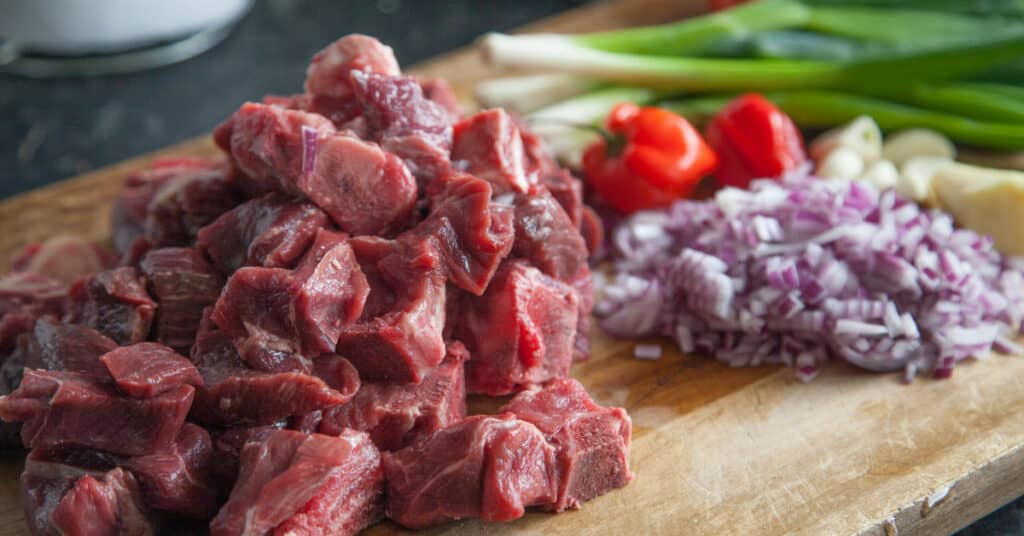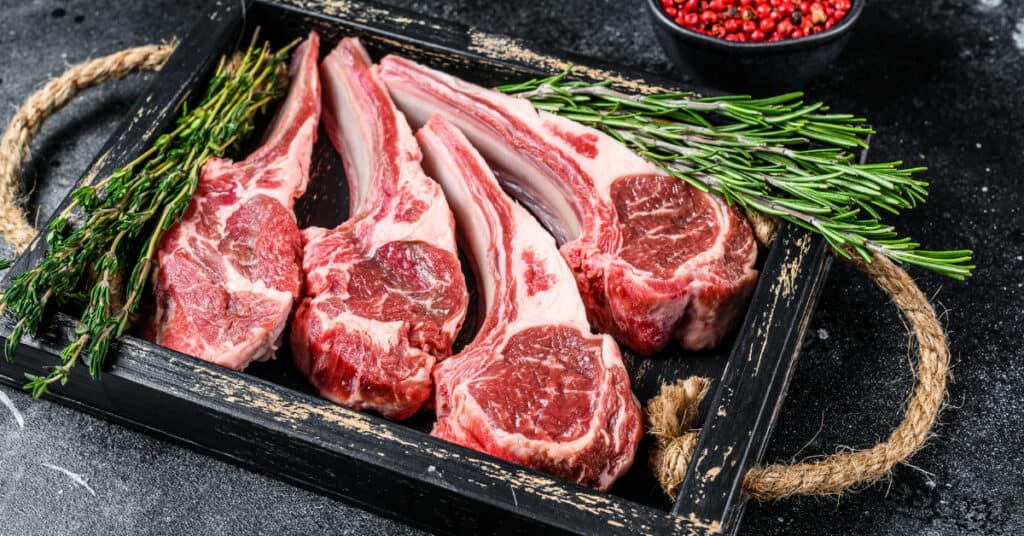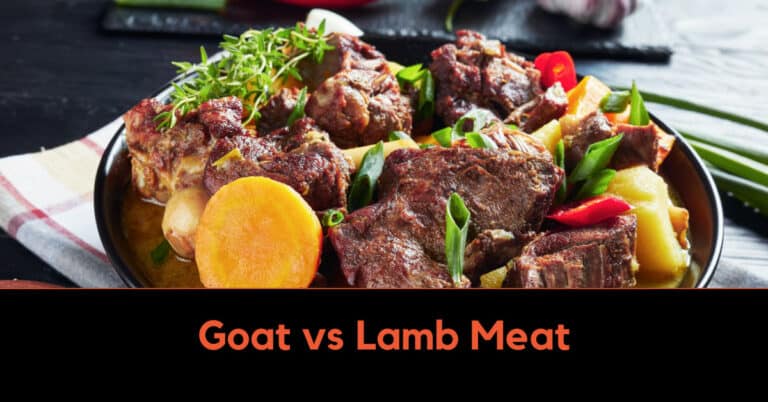SUMMARY: Goat and lamb meat are both popular choices, but they differ in terms of taste, texture, and nutritional value. Goat meat has a stronger flavor, is leaner, and contains higher amounts of iron and protein. Lamb meat has a milder taste, is more tender, and offers higher vitamin B12 and zinc levels. Ultimately, the choice between goat and lamb meat depends on personal preference and dietary needs.
Do you need help to choose between goat and lamb meat for your next meal?
If you find yourself torn between these delectable options, let’s dive into the differences and similarities between goat and lamb meat. In this article, I’ll provide you with a comprehensive comparison, exploring their flavors, nutritional values, culinary uses, and even environmental considerations. By the end, you’ll better understand which meat suits your palate and preferences.
Here’s what we’ll cover in this article:
- Flavors: Unraveling the distinct taste profiles of goat and lamb meat.
- Nutritional Values: Understanding the health benefits and differences between the two meats.
- Culinary Uses: Discovering the global cuisines and preparations where each meat shines.
- Environmental Considerations: Discuss the sustainable aspects of goat and lamb meat production.
Now, let’s embark on this flavorful journey and unravel the mysteries surrounding goat and lamb meat!
Goat vs Lamb Meat: Flavor Differences
Goat meat and lamb meat have distinct flavor profiles that contribute to their unique culinary appeal. Let’s explore their flavors and the dishes that showcase them:
Goat Meat: Rich, Earthy, and Bold
- Goat meat offers a rich and earthy taste with a slightly gamey undertone.
- Its intensity can be compared to beef, making it a fantastic choice for robust and hearty dishes.
- Popular goat meat dishes include:
- Jamaican jerk goat: Marinated with spicy jerk seasoning and slow-cooked to perfection, this dish captures the bold flavors of goat meat.
- Moroccan tagine: A slow-cooked stew that combines tender goat meat with aromatic spices and dried fruits, resulting in a harmonious, savory-sweet delight.
Lamb Meat: Milder with a Delicate Gamey Touch
- Lamb meat is known for its milder taste, making it more approachable for those who prefer a subtler flavor.
- It offers a delicate, gamey note, which adds depth and character to various preparations.
- Notable lamb dishes include:
- Roasted leg of lamb: A classic preparation that highlights the tender texture and mild flavor of lamb, often seasoned with herbs like rosemary and accompanied by flavorful pan juices.
- Greek moussaka: Layers of roasted eggplant, ground lamb, and creamy béchamel sauce create a satisfying dish that beautifully showcases the nuanced taste of lamb.
Whether you crave the rich, bold notes of goat meat or lamb meat’s milder, delicate flavors, each option promises a distinctive and enjoyable culinary experience. Next, we’ll explore the nutritional values of these meats to help you make an informed decision.

Nutritional Values
When it comes to nutrition, both goat meat and lamb meat offer unique benefits. Understanding their nutritional profiles can help you make an informed choice based on your dietary needs and preferences. Here are some key points to consider:
Leaner and Lower in Fat
- Goat meat is generally leaner than lamb meat, making it a good choice for individuals looking to reduce their fat intake.
- The low-fat content in goat meat makes it a healthier option for those following a low-fat or calorie-controlled diet.
- On the other hand, lamb meat tends to have a slightly higher fat content, which can contribute to its rich and flavorful taste.
High in Protein and Iron
- Both goat meat and lamb meat are excellent sources of high-quality protein.
- Goat meat, in particular, is known to provide a slightly higher protein content compared to lamb meat.
- Additionally, goat meat is also a good source of iron. This essential mineral plays a vital role in carrying oxygen throughout the body.
- Lamb meat also contains iron, albeit in slightly smaller amounts, making it a valuable addition to a balanced diet.
Essential Vitamins and Minerals
- Both goat and lamb meat contain essential vitamins and minerals supporting overall health and well-being.
- They are particularly rich in vitamin B12, crucial in maintaining healthy nerve function and producing DNA.
- Both types of meat also provide essential minerals such as zinc, selenium, and phosphorus, which contribute to various bodily functions and support immune health.
Varying Fat Content
- While goat meat is leaner than lamb meat, it is important to note that the fat content can vary depending on the cut of meat and how it is prepared.
- Cuts like the leg and loin tend to be leaner, while cuts with more marbling, like the shoulder, may contain slightly higher amounts of fat.
- Choosing lean cuts and trimming excess fat is recommended to reduce the overall fat content and calorie intake.
Considering the nutritional values of goat and lamb meat can help you make a well-rounded decision based on your dietary requirements. Whether looking for a lean protein source or incorporating essential vitamins and minerals into your diet, both options provide valuable nutritional benefits.
Remember, it is always best to consult with a healthcare professional or registered dietitian if you have specific dietary concerns or restrictions. Stay tuned for the next section, where we explore the culinary uses of goat meat and lamb meat!

Goat vs Lamb: Culinary Uses
Regarding culinary uses, goat meat, and lamb meat have their own unique roles in various cuisines around the world. Let’s explore the versatility of each meat and some popular dishes where they shine:
Global Versatility of Goat Meat
- Goat meat is prominent in many global cuisines, such as Indian, Middle Eastern, and Caribbean.
- In Indian cuisine, goat meat, commonly known as mutton, is widely used in dishes like biryani, curry, and kebabs. Its bold flavor adds depth and richness to these dishes.
- Middle Eastern cuisines feature goat meat in traditional dishes like mansaf, a Jordanian dish where goat meat is cooked in yogurt and served with rice.
- Caribbean cuisines also use goat meat, particularly in dishes like Jamaican jerk, where the meat is marinated and grilled to perfection, resulting in a tender and flavorful delight.
Traditional Lamb Preparations
- Lamb meat is popular in Mediterranean and European cuisines, known for its delicate flavor and tenderness.
- In Mediterranean cuisines, lamb is often used in traditional dishes like Greek moussaka and Moroccan tagines, adding a savory touch to the overall flavors.
- Roasting and grilling are standard methods of preparing lamb meat, resulting in delectable dishes like lamb chops or roasted leg of lamb.
- Lamb stews, such as Irish lamb stew, are also celebrated for their comforting and hearty flavors.
Embracing the unique flavor profiles of goat and lamb meat allows you to explore various culinary possibilities. Whether preparing a spicy Indian curry with goat meat or enjoying a savory roast lamb dinner, both meats offer distinct and satisfying dining experiences.
The following section will explore the environmental considerations associated with goat and lamb meat production.
Environmental Considerations
When choosing between goat meat and lamb meat, it’s essential to consider the environmental impact of their production. Here are some key ecological considerations to keep in mind:
Sustainability of Goat Meat Production
- Goats are known for their adaptability and require less land and resources than sheep. This makes goat meat production a more sustainable option.
- Due to their ability to forage on various vegetation types, goats can inhabit diverse environments, including areas with limited water resources, efficiently using available land.
- Goats also have a lower water consumption than sheep, reducing water usage in goat meat production.
- With their resource-efficient nature, goat meat can be a more sustainable choice in regions with limited land and resources.
Lower Carbon Footprint
- Goat meat production generally has a lower carbon footprint than lamb meat production.
- Goats have a more efficient digestive system, reducing methane emissions compared to sheep.
- Methane is a potent greenhouse gas, and its lower production from goat meat production can contribute to mitigating climate change impacts.
Societal and Cultural Significance
- The consumption of goat meat and lamb meat often has cultural and societal significance in different regions.
- In some cultures and traditions, goat meat holds symbolic value and is integral to special occasions and celebrations.
- Similarly, lamb meat is deeply rooted in Mediterranean cultures and is associated with cultural events and traditional festivities.
Considering the environmental impact of your food choices is essential for sustainable living. By choosing goat meat or lamb meat based on their respective production practices, you can positively impact the environment.
In the final section, we will recap the main points discussed and conclude the article.
Key Takeaways
In conclusion, while both goat meat and lamb meat are delicious and versatile options, they bring distinct flavors, nutritional profiles, and culinary uses to the table. By exploring the key takeaways from this article, you have gained a comprehensive understanding of these two types of meat:
- Flavors: Goat meat offers a bold and rich flavor profile, making it ideal for dishes with a robust taste. On the other hand, lamb meat provides a milder and slightly gamey taste, lending itself well to delicate recipes.
- Nutritional Values: Goat meat is a leaner and lower-fat alternative to lamb meat. It offers higher iron and protein content and beneficial vitamins and minerals. However, both meats have their own nutritional merits.
- Culinary Uses: The versatility of goat meat shines in various global cuisines, such as Indian, Middle Eastern, and Caribbean dishes. On the other hand, Lamb meat is renowned for its presence in traditional recipes from Mediterranean and European cuisines, where it is often roasted or grilled.
- Environmental Considerations: Goat meat demonstrates its sustainability by requiring less land and resources than sheep rearing, contributing to a lower carbon footprint.
Remember that personal preference remains a vital factor when choosing between goat and lamb meat. By experimenting with different recipes and exploring the unique characteristics of each meat, you can create culinary experiences tailored to your taste.
Thank you for joining us on this journey of discovering the nuances of goat and lamb meat. Enjoy your cooking adventures and bon appétit!
FAQ’s
Can I use goat meat as a substitute for lamb in a recipe?
Yes, goat meat can serve as a substitute for lamb in many recipes. However, remember that goat meat’s stronger flavor may alter the dish’s overall taste compared to lamb. Adjust seasonings and cooking techniques accordingly to achieve the desired result.
Is goat meat healthier than lamb meat?
Regarding fat content, goat meat is generally considered leaner than lamb meat. It also packs higher amounts of iron and protein. However, both meats offer beneficial vitamins and minerals. The choice between them ultimately depends on your specific dietary goals and preferences.
Are goat and lamb meats suitable for grilling?
Both goat and lamb meats are suitable for grilling and can yield delicious results. Marinating and slow cooking methods can help tenderize goat meat before grilling. On the other hand, Lamb meat can be marinated or seasoned and cooked over direct heat for a flavorful and tender outcome.
Which cuisines are renowned for using goat meat and lamb meat?
Goat meat plays a prominent role in several global cuisines, including Indian, Middle Eastern, and Caribbean dishes. It is often featured in recipes like Indian biryani or Jamaican jerk. Lamb meat is commonly found in Mediterranean and European cuisines. It is used in traditional dishes such as lamb kebabs or roasted lamb leg.
Does goat meat have any religious or cultural significance?
Goat meat holds cultural and religious significance in various cultures around the world. For example, specific communities commonly consume it during religious festivals and celebrations. Additionally, goat meat has historic ties to specific cuisines and is an important part of their culinary heritage.

